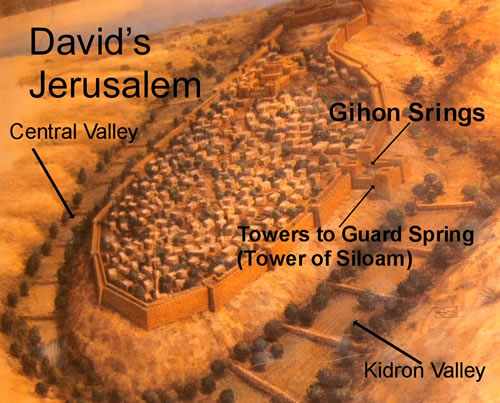 |
| David's and Natan's inspiration as to how to conquer Yebus (Jerusalem) is one of the many fine set pieces of Brooks's novel. |
Whether or not Natan (Nathan) really wrote a book that told the history of David the man and his rise to power, the fraternal wars and the Shlomo's (Solomon) success in defeating them all and taking the crown himself, choosing his voice and point-of-view for the telling was the right story-telling choice. As prophet and councilor -- and as at least celibate by choice or the Name's, or even a eunuch (his condition is never spelled out, though he informs the reader several times how much he is mocked by the he-men of David's court and family for it) -- he is the perfect insider outsider to know what goes on, and when, and with whom. He's a first-hand witness to many of David's most awful bloody deeds, as well as to his glories as a singer and musician. He's there to mark when David becomes obsessed with Uriah's wife, Batsheva. As the voice of the Name, Natan is literate, so he's more than capable of writing down the history of David and his sons. The reader believes in Natan's voice that observes of the now long dead King Shaul's (Saul) general, Avram (Abraham) -- "He had a voice like a grindstone." As with so many of Natan's observations and explanations, it is pitch perfect.
Other elements of The Lost Chord that readers will enjoy is the subtlety with which Brooks provokes them to recall the repetitions of figures and deeds that are in almost all Hero Cycles, such as the odd conditions of conceptions, exile, wise councilor, the foretold destiny, the unforeseen victory against overwhelming odds. It's the shared mythos's elements of Theseus, Hercules, King Arthur. I particularly noticed many echos of the saga of the historical Julius Caesar and his rise that modern interpretations of Caesar contain.
Among the many things that the Old Testament is, it is a endless recounting of cruel and bloody sins and deeds, not the least of which are plunder, genocide and rape. David's story is central to the beginning and the end of these Old Testament cycles. Warning, this novel is a very good one, beautifully written. The content, however, is not happy and often very ugly, including a graphic account of a prolonged, brutal rape and beating while it happens.
David has the blessing of the Name, i.e. the Biblical God who cannot be named by His Name by men. But David's also man and he always does "what is necessary," to survive, rise to secular power, possess that power and to keep it -- for himself, primarily, and for his sons. But over and over, being a man, who in so many ways is unable to govern himself in his greed for women and his love of his sons by his many wives of rival tribes, incapable of not goading of the enemies surrounding the Land by greed what is not the Land's, the city that becomes his capital and which he renames for himself and which becomes Jerusalem -- his reign is never peaceful, never non-disputed, even by his own sons, who kill each other and rebel against him. The final, precipitating catastrophe is his oldest son Amnon's rape of his full sister, Tamar, because, like his father David's earlier rape of Batsheva, he cannot bear to be denied anything to which he takes a fancy, even if denied it by the laws of the Name.
Why does this man, who commits crime after crime, often not because it is what is necessary for power and preservation of a realm, but for personal and petty reasons, have the Name's blessing? Natan, David's councilor and prophet, struggles with these questions. He concludes the justification for it all is that David fathers Shlomo (Solomon) upon Batsheva (Bathsheba), whose own reign over a Great Land, whose wisdom brings peace and wealth that will be remembered eternally. Even David's rape of Batsheva and the murder of her husband so he can possess her as his wife, is excused by this, because it was God's will, the destiny God had marked out for this man, who then was filled with God's blessing.
 |
| David dancing before the Ark of Covenant that he had brought to Jerusalem. This is another of the The Secret Chord's fine set pieces. |
In the Christian perspective of these matters, David is central because he is of the house and tribe from which comes Jesus many centuries later. But this is not a Christian tale nor a Christian perspective. Shlomo's kingdom's dominance and endurance was not even a blink in the eye of history. Unlike Natan, then, one is tempted to conclude all this murder, gore, torture, rape and massacre was for nothing much viewed within the long current of the Land's history, which has remained ever since bloody, violent, disputed and at war.
------------------------------
* I heard Geraldine Brooks talk of writing The Secret Chord on WNYC's noon - 2 PM daily talk show. This woman knows her Bibles and Old Testaments, her archeology and other histories. I immediately went looking for her novel, she was so admirable. From what she said, and how she said it, it was clear she was a very fine story teller and writer. The discussion can be heard, streamed, at this link.


No comments:
Post a Comment